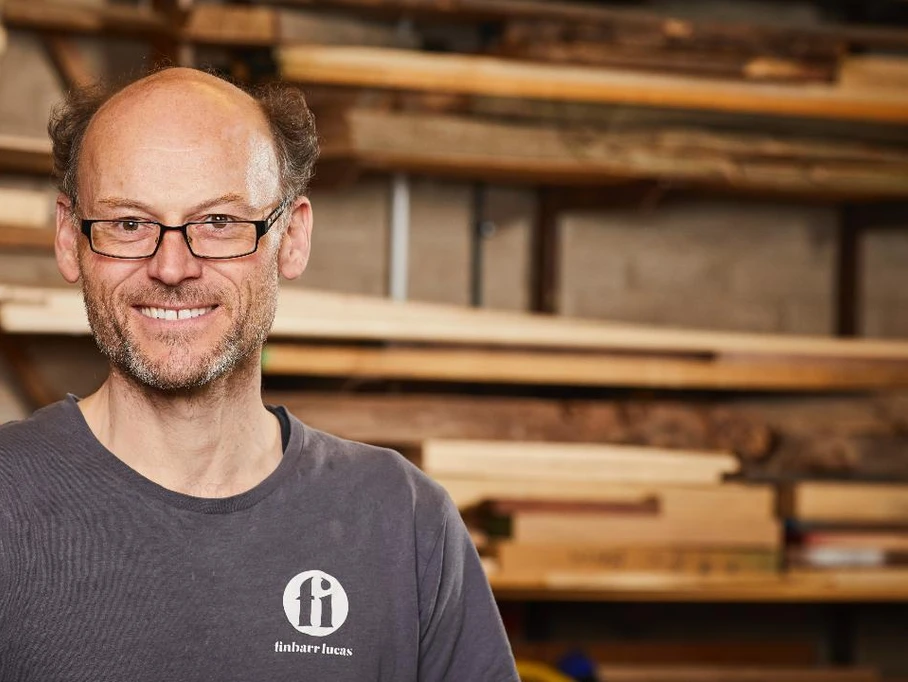
This month’s sustainable journey story is from Finbarr Lucas, who runs a Sheffield based business crafting beautiful furniture from locally sourced wood. Finbarr is also one of the founding members of Sheffield Sustainability Network.
We asked Finbarr to answer a few questions about his sustainability journey, and you can read his responses below. We will be sharing more stories like this from other members of Sheffield Sustainability Network, and hope that you find their insights useful.
Q: When did you start thinking about sustainability in terms of your business?
I set this business up in 2001. I was determined that it had to be ethically sound, and at that stage my main focus was in using sustainably-sourced materials. It took me a long time to achieve this because you don’t always get a choice about the work you are asked to do when you start, and I made an awful lot of MDF-fitted cupboards! It’s not a particularly green material but I always built them as well as I could so the work would be kept for as long as possible.
I had this phrase that guided me when I started: I wanted to do ‘good, useful work that benefits myself and the community’. In some ways, that’s sustainability really. It felt like if I was making good furniture out of good materials then I was doing something useful. If the world had one of me doing that, then it would be slightly better – that’s how I felt.
Q: What kind of day-to-day challenges have you faced, following this business principle? Did you find it quite hard to carve a niche?
I’ve managed to get across in my marketing that I have a sustainable approach, which means I often get people contacting me saying: ‘I’ve found your website – I love your ethos.’ Then they’ll either ask me to make them something, or ask me for a job!
I don’t think I’m as good at marketing as I should be, and therefore it’s taken me longer than it might take another person to create a green business, but I feel it’s in place now. I use a lot of locally-sourced timber and I find customers who want to pay for things that are made well, and that’s a big part of sustainability. If you buy a table once every hundred years – as opposed to one every ten years – that’s nine fewer tables the world’s not had to give its resources to. So I’m always trying to make long-lasting, well-designed, well-finished work that people can’t bring themselves to throw away.
It’s great to use locally-sourced materials but if I’m using those materials to make rubbish work it’s irrelevant to me. I can’t bear the idea that I make something so shonky that within a few years someone will just say ‘oh, this has got to go!’
Q: Do you think there is more of a market for sustainable products now than say five years ago?
I think so, particularly within my own realm of craft. I think there’s definitely a move towards handmade and one-off work. There’s so much stuff in the world. I’m sure we’re making twice as much stuff as we were even since I started my business 20 years ago. And this volume of stuff is overwhelming. More and more people are coming around to the idea that it’s better to spend money on a unique, handmade piece that they’ve got more of a connection to.
But this is within the world of craft – I don’t know how much that’s about sustainability. I’d like to believe the whole world’s turning green, but I think people are being forced that way by the circumstances.
Q: What advice would you give to someone who perhaps has a similar business to yours, who wants to be more sustainable but might not know where to start?
I have had this conversation with lots of people over the years. I get contacted, often by people right at the beginning of their careers, asking ‘how do I start a business like yours?’ Most people have already started in some fashion, wanting to build a green business, but they find themselves a year or two in doing work like hanging doors or fitting laminate flooring. They ask me ‘how do I get to where you are?’
I did the same kind of jobs as they did at the beginning, because in many ways I wasn’t brave enough at first to start the sustainable furniture business I wanted. I started doing anything and everything to get more experience and skills, and to bring some money in. To turn it into the business I have today, I always tell people it’s like steering an oil tanker really. It takes a long time to move it around. Every time you do anything that gets you to a bit closer to where you want to go, you photograph that and promote it. Don’t promote anything that you don’t want to do. In that way, slowly but surely, you start looking like the kind of maker who only works with sustainably-sourced materials, and makes only high-quality work. Then over time you’ll get more and more of that kind of work. That would be my advice to any craftsperson really.
Some people when they start a business hit the ground running, with a marketing plan and some money, but I didn’t have that. I started with a hopeful, youthful confidence and carried on from there.
This is a low carbon Instadesign website on sustainable hosting.